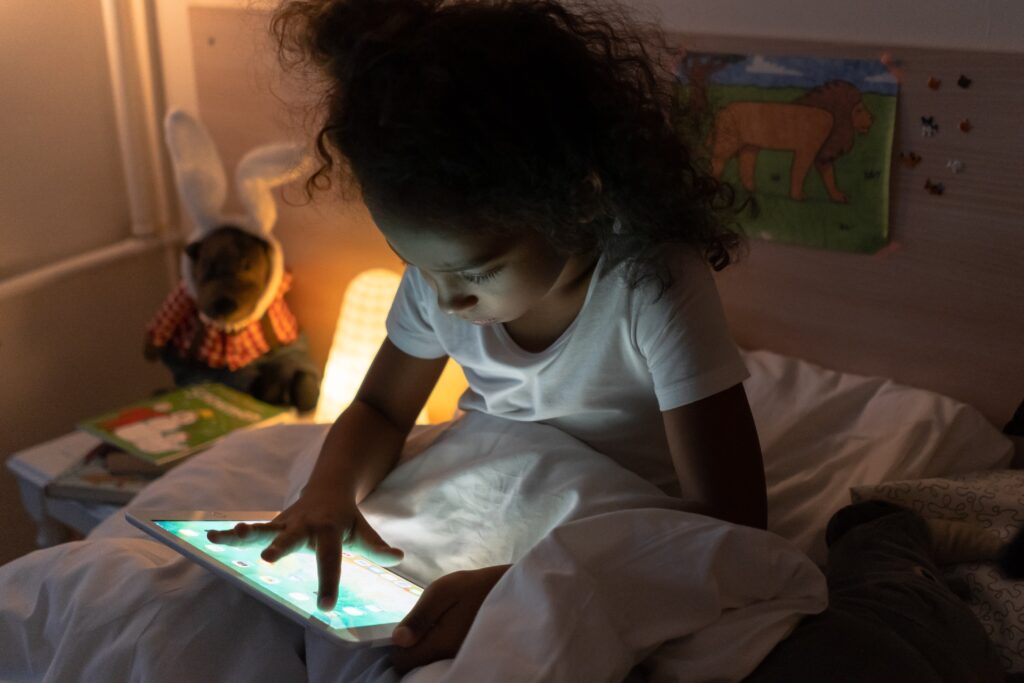How Screens Impact Children’s Sleep
August 1, 2023

We watch TV before bed or scroll on our phones. We’re all guilty of this. The end of the day often seems like the only time of day we have a few minutes to ourselves to zone out and relax. It’s no secret that screens can impact our sleep as adults. We’ve all been in this situation – just a few minutes of scrolling on the phone turns into an hour and going to bed late. But, what about children? We know screens affect their sleep too but how exactly. Have you wondered how screens impact children’s sleep?
Today, I’ve got you covered. We’re going to dive into how screens impact our little one’s sleep and finally, tips for how to manage screens for children and promote healthy sleep.
How Screens Impact Children’s Sleep
The Blue Light Effect
One of the main culprits behind the sleep disruption caused by screens is the blue light emitted by electronic devices such as smartphones, tablets, and televisions. Blue light suppresses the production of melatonin, a hormone that regulates sleep and wakefulness. Exposure to screens close to bedtime can delay the release of melatonin, making it harder for children to fall asleep and maintain a consistent sleep schedule.
Delayed Sleep Onset
Screen time before bed can also contribute to delayed sleep onset aka going to bed too late. Engaging in stimulating activities, such as playing video games or watching action-packed shows, can make it harder for children to unwind and mentally prepare for sleep. The content itself can also trigger emotional responses or excitement, further delaying the onset of sleep.
Using screens often displaces the time children would have otherwise spent sleeping. This is especially true as children get older and stay up later than normal either watching TV or playing on their phones. If given the option, many children will choose to delay bedtime in order to use screens.
Poorer Sleep Quality
Excessive screen time can lead to sleep fragmentation, characterized by frequent nighttime awakenings. The content children consume on screens can be emotionally stimulating or evoke strong reactions, leading to nightmares or disturbed sleep. Current studies are also looking at whether screens also reduce time in REM or deep sleep.
Tips for Managing Screen Time and Promoting Healthy Sleep
- Establish Screen Time Limits: Set clear boundaries for screen time and establish consistent rules regarding usage. Encourage other activities such as reading, outdoor play, or creative hobbies.
- Screen-Free Wind-Down Routine: Encourage a screen-free wind-down routine before bedtime. Replace screen time with calming activities such as reading a book, taking a warm bath, or engaging in quiet family time.
- Create a Sleep-Friendly Environment: Remove screens from the bedroom to eliminate temptation. Ensure the bedroom is conducive to sleep by minimizing noise and maintaining a cool and dark environment.
- Implement a Digital Curfew: Establish a designated time when screens are turned off for the night. This allows the body to naturally wind down and prepare for sleep without the interference of blue light.
- Lead by Example: Be a positive role model by limiting your own screen time before bed.
While screens are a ubiquitous part of life, we have control over when and how our children use them. Hopefully this article provided some insight on how screentime interferes with sleep and steps you can take to encourage healthy sleep habits. If your little one is struggling with any aspect of sleep and you need help, I encourage you to reach out to me. I’d love to help!
References